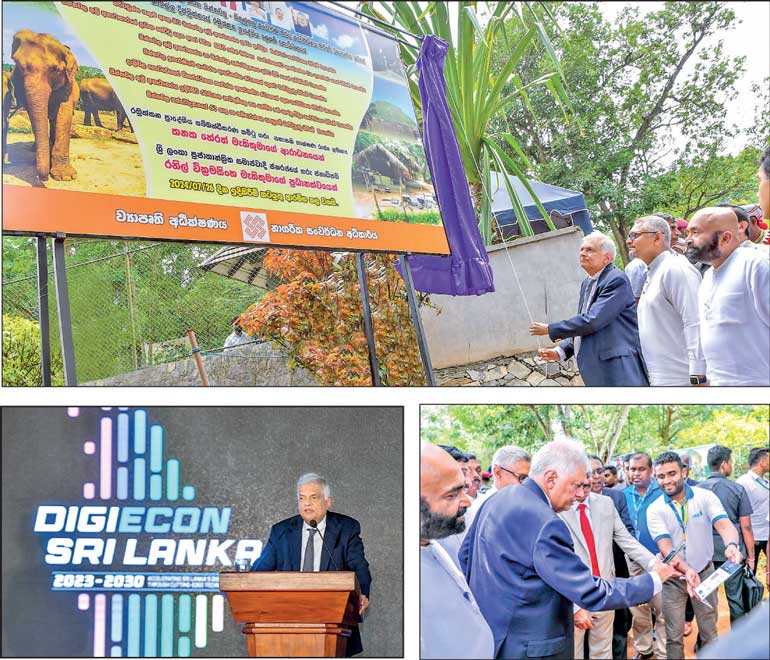Tuesday Feb 24, 2026
Tuesday Feb 24, 2026
Saturday, 27 July 2024 00:14 - - {{hitsCtrl.values.hits}}

President Ranil Wickremesinghe yesterday expressed his belief that it is possible to establish a modern economy in Sri Lanka within the next 10 years, ensuring that development benefits both urban and rural areas.
He shared his vision for Sri Lanka to strengthen its currency and improve foreign reserves through an enhanced export economy, whilst collaborating with major economies like India, China, and Singapore.
Wickremesinghe made these remarks during an event at the Rambukkana Parakrama Maha Vidyalaya, where he participated in providing smart classroom equipment for schools and piriven under the ‘Digital Economy Strategy 2030’ initiative. The program, implemented jointly by the Education and Technology Ministries, marks a significant step towards expanding digitisation across the country.
The President emphasised the significance of QR codes in financial transactions and the need to raise public awareness about this technology.
“Today, countries like India and China are rapidly undergoing digitisation, with all their financial transactions conducted through mobile phones. We must also reach that level. In this context, the QR code becomes crucial. It is essential to raise public awareness and introduce this technology to them. Therefore, I want to emphasise the importance of this program,” he added.
He announced readiness to provide opportunities for anyone in the country to collaborate with economies from all nations, including India, China, and Singapore.
“For this, we need to strengthen our currency and improve our foreign reserves. We are currently working towards these goals. By strengthening our export economy, we can increase our foreign exchange. With a solid foreign exchange reserve, we can engage in transactions with these countries without any issues,” he elaborated.
The President called for collective action in advancing the economy whilst expressing his gratitude to all political parties in Parliament for their support in adopting the Economic Transformation Bill.
He stressed the importance of uniting to advance this initiative, which aims to develop an export-centred digital and green economy in Sri Lanka. Wickremesinghe stressed the importance of establishing a green and digital economy, noting that the Economic Transformation Bill provides the necessary legal framework for this transition.
He acknowledged the unanimous support from political parties in Parliament and called for continued collective effort in this endeavour. “I am grateful to all political parties in Parliament for coming together on this initiative. I declare that we will move forward collectively with this work,” he added. Wickremesinghe noted the rapid advancements in technology and the need for the country to adapt. He highlighted the contrast between the current digital tools available to students and the more traditional resources of the past, underscoring the importance of preparing the next generation for a technology-driven future. Wickremesinghe also spoke about his invitation to Elon Musk to assist in bringing technological advancements to Sri Lanka, highlighting the need to spread these benefits to rural areas.
He noted that the Parliament recently debated AI technology, with many speakers referencing insights from ChatGPT, demonstrating the country’s readiness to embrace new technological developments.
Following the ceremony, President Wickremesinghe attended an event at the Pinnawala Zoo in Kegalle to introduce a QR code system as part of a comprehensive program aimed at empowering over 1 million Micro, Small, and Medium Enterprises (MSMEs) in the Kegalle District.
The Tourism and Lands Ministry is also set to develop seven new projects in the Rambukkana Divisional Secretariat under the Pinnawala Kithulgala Tourism Development Project. These projects include the development of pathways, installation of streetlights, enhancement of tourist attractions, establishment of vehicle parking areas, improvement of sanitary facilities, and initiation of road development projects.
At the Pinnawala Zoo event, President Wickremesinghe visited the DIGIECON exhibition stall and officially launched payments through QR codes.
He also toured the construction site of the Kotelawala Defence University at the Wagolla Agricultural Training Centre and presented SLS certifications to entrepreneurs.
Reflecting on the country’s journey from economic crisis to recovery, Wickremesinghe emphasised the necessity of transitioning to a digital economy. He mentioned the importance of integrating technological knowledge into various sectors, including agriculture and business, as well as the implementation of smart classrooms in schools and piriven.
Under the ‘Digital Economy Strategy 2030’, the Technology Ministry focuses on six key pillars: infrastructure, connectivity and access, skills, literacy, industry and employment, cybersecurity, security and privacy, digital financial services, e-governance, industry sectors, and digitisation.
The first phase of this initiative was launched in the Kegalle District, with smart classroom equipment distributed to 42 piriven and 62 schools.